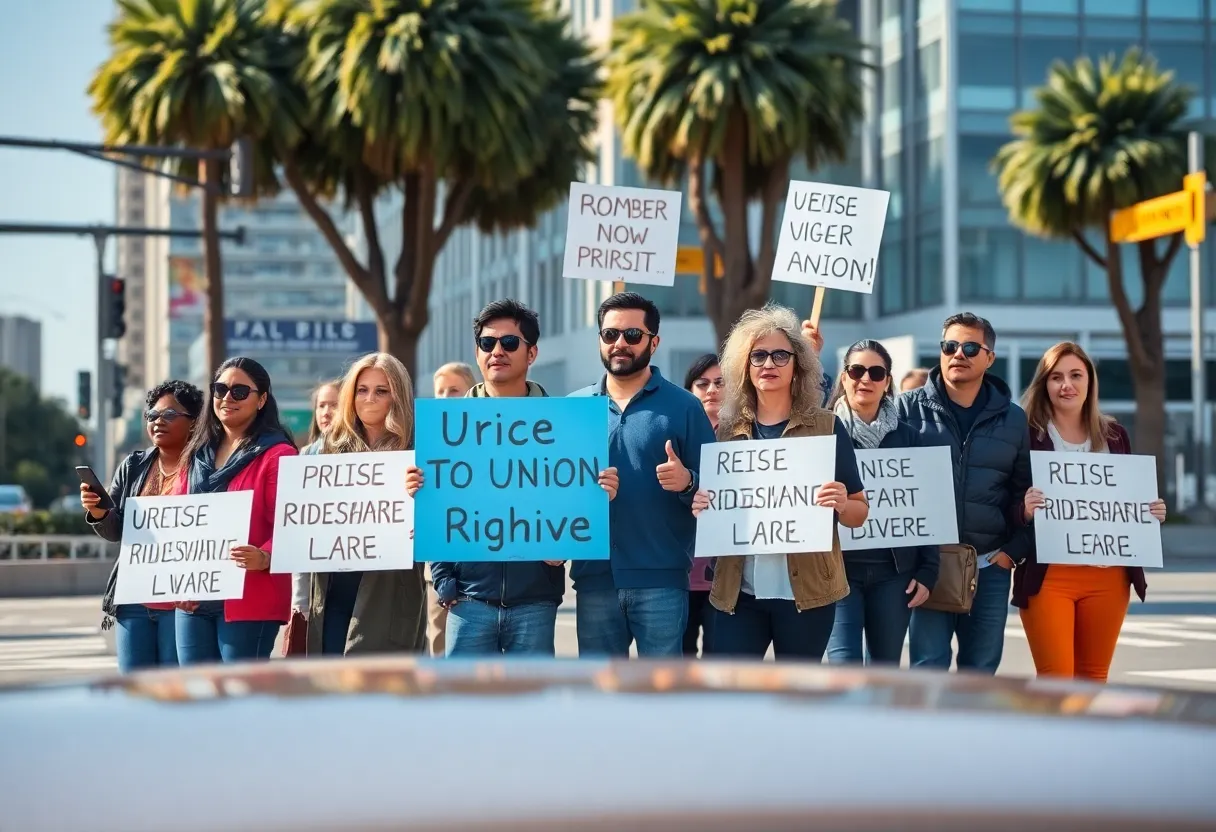California, August 30, 2025
News Summary
California has enacted legislation allowing Uber and Lyft drivers to unionize and engage in collective bargaining, benefiting around 800,000 drivers. Supported by Governor Gavin Newsom, this framework, arising from Assembly Bill 1340 and Senate Bill 371, aims to enhance drivers’ negotiation power while introducing significant insurance reforms. While the agreement marks a substantial step forward for gig workers, it does not alter their classification as independent contractors or extend benefits to food delivery workers. The legislation is set for a swift passage through the California legislature.
California has made a significant move in the ongoing conversation about gig worker rights, as Uber Technologies Inc. and Lyft Inc. have agreed to support a new legislative framework that allows drivers to unionize and engage in collective bargaining. This noteworthy development arises from the recently passed Assembly Bill 1340 (AB 1340) and Senate Bill 371 (SB 371), designed to establish these rights while simultaneously alleviating insurance costs for the rideshare companies.
The agreement is a landmark legislative measure that has gained the endorsement of key figures, including California legislative leaders and Governor Gavin Newsom. The new framework is anticipated to benefit approximately 800,000 drivers in California, who will gain a structured way to negotiate their pay, job protections, and benefits without oversight from federal agents. Provisions within this legislation enable drivers to initiate a union through a petition that requires signatures from at least 10% of active drivers.
The legislative backing, particularly from the Service Employees International Union (SEIU), which sponsored AB 1340, emphasizes the significance of this agreement as it represents the “largest expansion of private sector collective bargaining in California history.” While the agreement does not alter the current classification of gig drivers as independent contractors—confirmed by Proposition 22 in 2020—it allows a new model for negotiation within the existing legal framework.
The legislation also introduces significant insurance reforms. Currently, rideshare companies face high costs for uninsured motorist coverage, which can consume up to 45% of fares in certain areas like Los Angeles. Under the new agreement, the requirement for uninsured motorist insurance will be reduced from $1 million to $60,000 per rideshare driver, as well as a decrease to $300,000 per accident.
While the agreement appears to pave the way for improving conditions for drivers, not all gig workers will benefit, as the deal does not extend to food delivery workers or similar independent contractors. Critics and experts have expressed skepticism regarding the effectiveness of this unionization path, raising questions about whether it will lead to significant advancements in workers’ rights and conditions. Notably, certain essential protections, such as a right to strike and access to employer wage data, were not included in the bills.
The legislative journey of both AB 1340 and SB 371 is expected to be expedited through the California legislature, aiming for passage by mid-September. The move could also inspire similar agreements in other states, suggesting that this California initiative might serve as a template in ongoing conversations surrounding gig workers’ rights nationwide.
Despite the mixed reactions, drivers and advocates remain hopeful that the framework will empower them to voice grievances more effectively and negotiate for improved working conditions in an industry that has long faced scrutiny over its treatment of independent contractors. Ongoing debates surrounding classification, compensation, and worker protections for rideshare drivers continue to evolve in courtrooms and legislative halls across the state.
Frequently Asked Questions
What is the new legislative framework for California drivers?
The framework allows Uber and Lyft drivers to unionize and engage in collective bargaining through Assembly Bill 1340 and Senate Bill 371.
How many drivers will benefit from this agreement?
Approximately 800,000 drivers in California are expected to benefit from the new provisions.
Will the classification of gig drivers as independent contractors change?
No, the legislation does not change the legal status of gig drivers as independent contractors as confirmed by Proposition 22.
What changes are being made to insurance requirements?
The requirement for uninsured motorist coverage will be reduced from $1 million to $60,000 per rideshare driver, and $300,000 per accident.
Are food delivery drivers included in this agreement?
No, the legislation does not extend to other gig workers, including those delivering food through apps like DoorDash.
| Feature | Description |
|---|---|
| Unionization and Collective Bargaining | Drivers can now organize and negotiate pay and job protections. |
| Insurance Reforms | Uninsured motorist coverage reduced from $1 million to $60,000. |
| Direct Impact | Approximately 800,000 drivers will benefit from the new framework. |
| Independent Contractor Status | Current legal status of gig drivers remains unchanged. |
| Legislative Support | Backed by Governor Gavin Newsom and key legislative leaders. |
| Exclusion of Other Gig Workers | Deal does not apply to food delivery workers or similar roles. |
Deeper Dive: News & Info About This Topic
- Los Angeles Times
- Wikipedia: Gig economy
- Politico
- Google Search: California Uber Lyft drivers unionization
- TechCrunch
- Encyclopedia Britannica: Union (Collective Bargaining)
- SFist
- Google News: California gig worker unionization
- Insurance Journal

Author: STAFF HERE SAN DIEGO WRITER
The SAN DIEGO STAFF WRITER represents the experienced team at HERESanDiego.com, your go-to source for actionable local news and information in San Diego, San Diego County, and beyond. Specializing in "news you can use," we cover essential topics like product reviews for personal and business needs, local business directories, politics, real estate trends, neighborhood insights, and state news affecting the area—with deep expertise drawn from years of dedicated reporting and strong community input, including local press releases and business updates. We deliver top reporting on high-value events such as Comic-Con International, San Diego County Fair, and San Diego Pride Festival. Our coverage extends to key organizations like the San Diego Regional Chamber of Commerce and United Way of San Diego County, plus leading businesses in biotechnology, healthcare, and technology that power the local economy such as Qualcomm, Illumina, and Scripps Health. As part of the broader HERE network, including HEREAnaheim.com, HEREBeverlyHills.com, HERECostaMesa.com, HERECoronado.com, HEREHollywood.com, HEREHuntingtonBeach.com, HERELongBeach.com, HERELosAngeles.com, HEREMissionViejo.com, and HERESantaAna.com, we provide comprehensive, credible insights into California's dynamic landscape.





